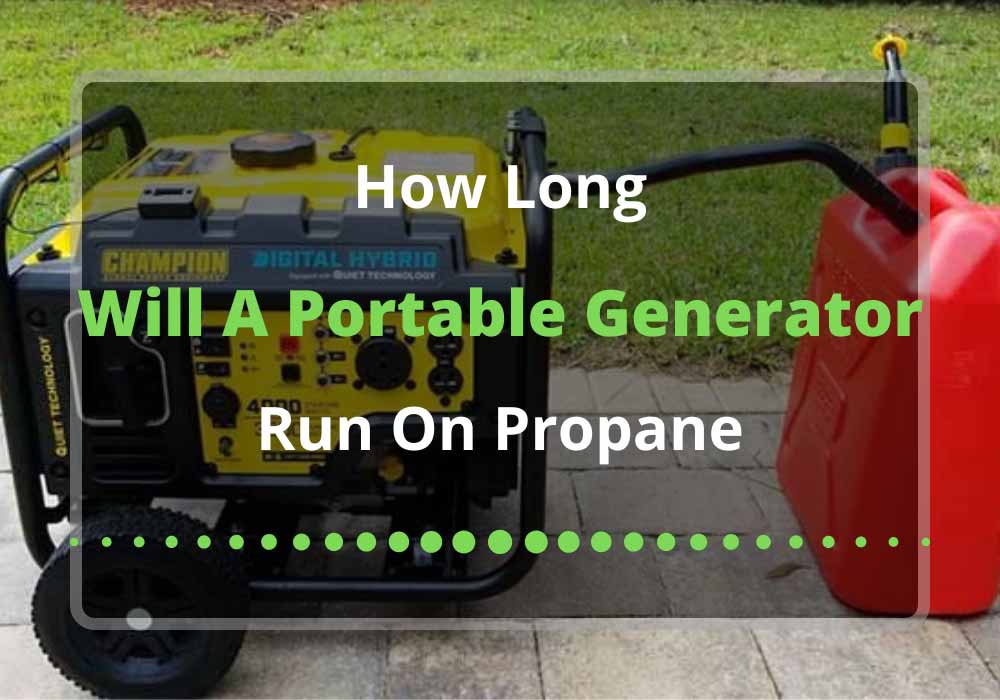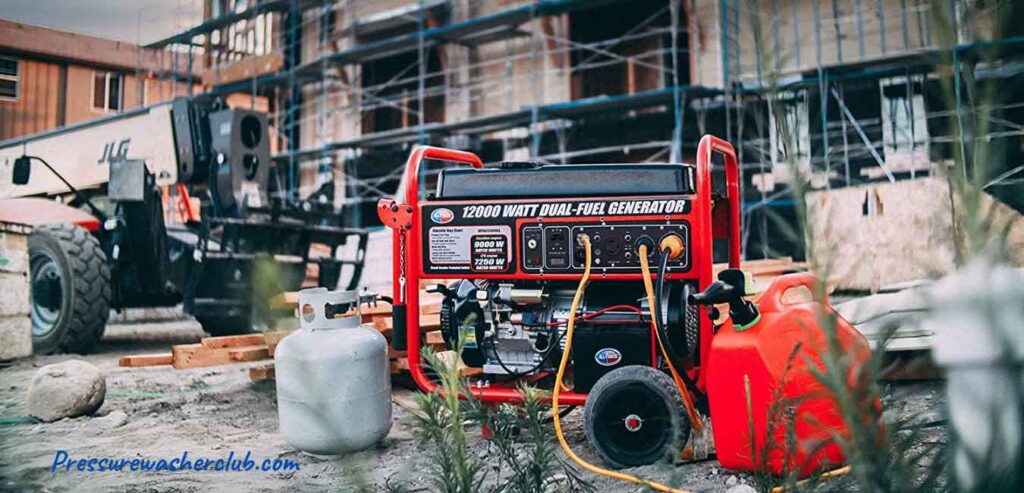The United States has experienced more absurd weather conditions than before over the past twenty years. Therefore, a lot of people are seeking to secure an emergency backup power source.
Generators play a significant role here. Power outages caused by extreme storms call for a generator that can keep you warm and dry. In addition to being fuel-efficient, purchasing a propane-fueled generator will also help reduce greenhouse gas emissions.
The article explains how to figure out how long your propane tank will last when operating your generator. Twenty lbs. of propane will typically power a generator for about five hours.
In order for a generator to operate, 2-3 lbs. of propane will be used per hour. Nevertheless, this amount of time will decrease if the load increases.

Contents
How Long Will A Generator Run On A 20lb Tank Of Propane?
An average generator is powered by either a 20-pound or 30-pound fuel tank. The tank, in this case, will operate for approximately 4.75 hours at half its maximum capacity. This will also run about 14 hours with a 60-pound tank.
An average 20-pound tank operates for about five hours. Naturally, running time decreases as load increases. As time passes, propane doesn’t degrade.
It is often one of the factors people consider when selecting a backup power supply. In return, propane may not be necessary for a considerable amount of time.
How Long Will A 7500-Watt Generator Run On Propane?
A 7500-watt generator can power most household appliances. Generators with 7500 watts are generally powered by gasoline. The ability to run a generator with either gasoline or propane is available with dual-fuel generators.
This generator will keep on operating for 8 hours when it is filled to 50% capacity with gasoline when the tank is 6.0 gallons. However, if you are utilizing a 20-pound tank, it will run for 5.5 hours when operating at half the load.
Is It Cheaper To Run A Generator On Propane?
Generators powered by propane tend to be less expensive than those powered by natural gas. It is true that natural gas units typically use less fuel, but some individuals are attracted to their lower initial cost.
Since NG generators’ fuel is cheaper by the unit when a natural gas line runs underneath your home, many people choose NG generators.
It’s difficult to say with any degree of certainty since prices fluctuate, but it does happen quite often. You must take into account the area in which you live when calculating cost.
The energy density of propane per cubic foot is higher than that of natural gas. Propane provides 2,490 BTUs per cubic foot versus 1,040 BTUs for natural gas. Natural gas will burn twice as much as propane in the same amount of time. However, this does not imply propane is less expensive than natural gas.
As a result, it is more expensive. The propane will last longer when it comes to running out of fuel, so it is a better choice if you are concerned about running out.
How Long Will A 5-gallon propane tank run A Generator?
Generally, they will be running for eight to twelve hours, depending on the load. On the contrary, if you look at similar generators sold by Home Depot and Lowes, you may discover that they are a bit overrated.
I’ve heard about people running 16-18 hours on his 4KW, but it sounds like they may only have a few lights running on it. It’s a safe bet to say that even at a full load, you’ll use no more than 1 gallon per hour and may be less than 1/2 gallon on a small machine like that.
How Long Will A 22kw Generator Run On 500 Gallons Of Propane?
The generator can power a three-four thousand square foot home at 22 kW. As well as running the washer or oven, it will also run the HVAC equipment.
By choosing appliances with care while the generator is running, you can extend the propane’s life and make it more effective. If you want your electrical systems in the house to be powered by a larger generator, you should do it.
In addition, propane generators use 2-3 gallons per hour approximately, depending on the load they are powered by and the size of their generators. In other words, if your tank is 500 gallons, but you can only fill it to 400 gallons, then you will only last 6 to 7 days with a full tank.
The full load consumption of a 22 KW Generac generator is 9.7 cubic meters of natural gas. Your home will remain functional for an indefinite period of time if it is directly connected to the natural gas lines.
Propane Generator Fuel Consumption
The typical generator consumes between 2 and 3 pounds of propane per hour. Thus, 20 pounds of propane can provide enough fuel for a generator to operate for five hours.
As long as the propane supply is available, the generator will run. Most 500 to 1000 gallons propane tanks are used is households. Whether they are below or above ground, they are usually around this capacity.
An hour’s propane usage by a propane generator is 2-3 gallons. You can run your home continuously for a week on a 500-gallon tank. The 1,000-gallon tank lasts for two weeks.
Propane Vs. Natural Gas Generator
An emergency power generator is invaluable in times of need. The most popular options for generators are propane and gas, but which is better?

Propane Generators
Propane generators produce electricity by burning propane to generate energy. They operate like other types of generators. In the process of refining petroleum and processing natural gas, propane is produced as a byproduct.
There are portable and standby propane generators available, which may be used for powering a variety of appliances and machinery.
Gas Generators
Due to their affordability and efficiency, gasoline-powered generators remain a popular choice of generator. With a gas generator, an internal combustion engine turns a shaft, causing an armature to rotate. Electromagnetic induction created by the armature operates a gasoline generator.
Which One Is Better?
This type of fuel is clean, environmentally friendly, and very quiet. Carbon monoxide (CO) emissions are minimal since this fuel burns cleanly.
Despite being one of the most environmentally safe and longest-lasting generators available, Propane generators do have certain limitations. A propane generator is more expensive than an affordable gasoline generator.
In comparison to propane generators, gas generators offer many advantages. People choose gas because it is cheaper than other fuels. A gasoline generator usually costs less to buy and install than an electric generator.
A gas generator will also produce more heat than a propane generator, about 30% more. As a rule of thumb, a gas generator will generally be cheaper to run unless you live in a place where propane is significantly cheaper than gasoline.
Generators powered by natural gas run for as long as they are needed. It is always possible to operate a gas line with the pressure it needs. There will still be pressure in the line if there is no electricity.
In natural gas generators, the generator turns on automatically once the main power source has been cut off.
In A Nutshell
A natural gas generator is advantageous in that it can be operated for as long as required. It will maintain a constant pressure as a result of the pressure in the natural gas lines. You will still have access to the electricity you need to keep your home cozy, even during a power outage.
Natural gas generators will automatically begin to operate once the default source of power has been restored. Until the propane runs out, a propane powered generator will operate. Most of the propane tanks on the market are capable of holding 500 to 1,000 gallons of gas.
Why Run A Generator On Propane?
Most generators are used on standby, which means they spend the majority of their time not operating. The inner parts of an engine can clog when diesel fuel and gasoline are left sitting for a long period, up to 6 months.
This damage can be done to fuel lines and rubber seals over time. Cold weather can make starting diesel and gasoline extremely difficult. With clean-burning propane, you can use other appliances in your house, reduce engine wear, and the fuel has an indefinite shelf life.
Final Words
Before deciding on the right size for your aquarium, you should understand the options available. It won’t be enough power for a whole home to be heated using a 20 lbs. tank, but at least you have spare tanks to keep on hand.
A gas retailer can easily refill them when and as needed. Among residential customers, many find 20-pound propane tanks to be most convenient and useful. Gas grills, fireplaces, and small appliances that don’t require a strong energy source would be perfect for connecting to this device.